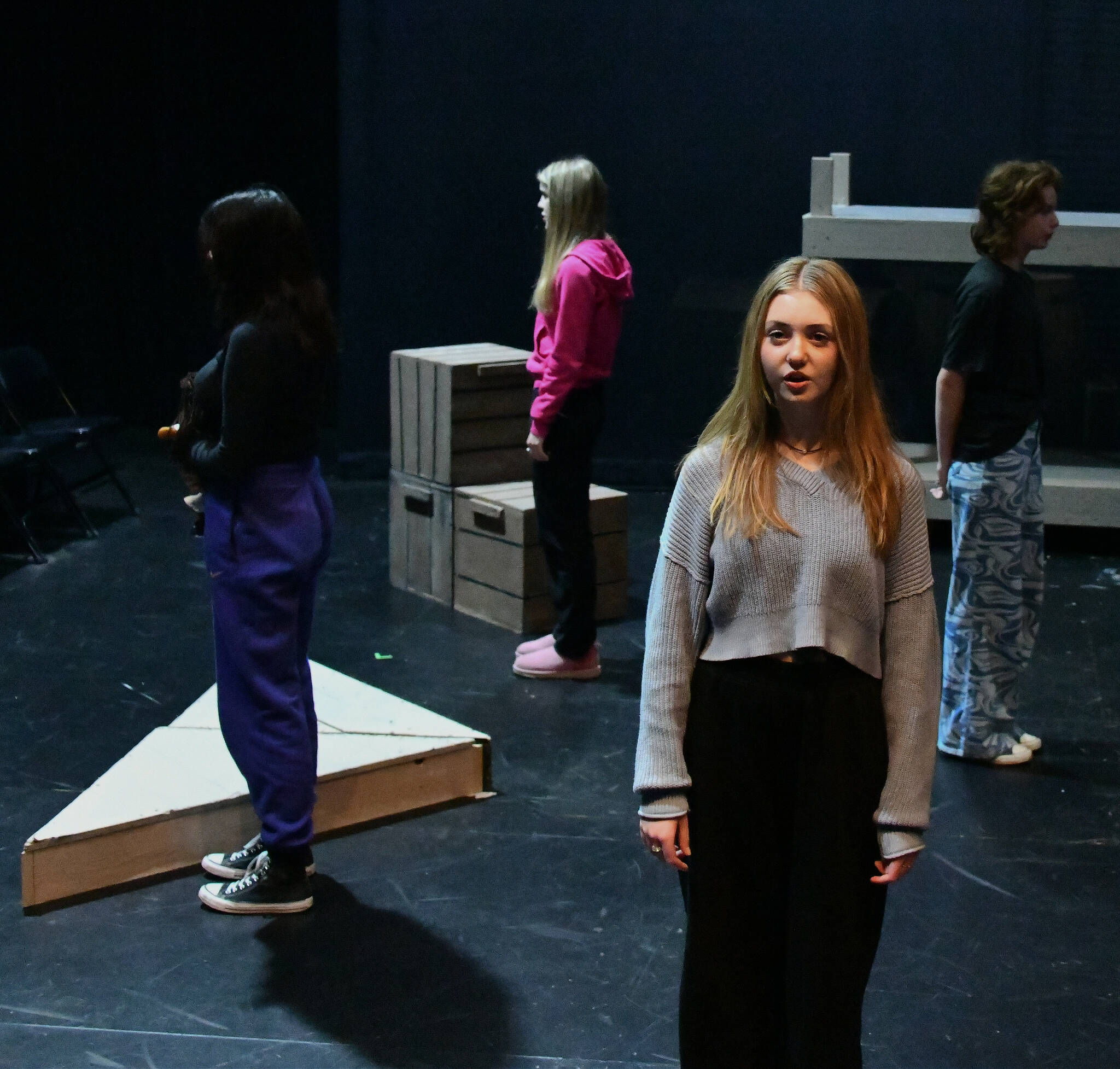As the lighting in the theater dimmed, a nearly silent intensity filled the air as the stern-faced actors took their places and prepared for an afternoon rehearsal of “And a Child Shall Lead.”
Written by Michael Slade and based on a true story, a group of children are fearful, hopeful, strong and resilient as they are trapped with millions of others in Terezin, the “Jewish city” situated 30 miles outside of Prague, Czechoslovakia, that the Nazis created as a way station before Auschwitz and other death camps, according to Playscripts and other online documents.
With two casts — Butterflies and Wildflowers — comprised of 25 actors, the Mercer Island High School (MIHS) drama department will perform the play eight times from Feb. 2-4 and 9-11 at the school. The play is recommended for attendees 12 and over, and representatives from the Anti-Defamation League will participate in a talk-back following the Feb. 2 and 9 performances.
“Though these children are fighting to survive, they find sources of hope and beauty to keep them alive, even at the risk of being caught and killed. The text of the found poems are intertwined throughout the play,” reads a press release.
Sophomore Katie McGuire, who plays Pavel Hoffman in the Wildflowers cast, said that during the critical play, the actors will be striving to reach out to the audience and have them connect with the characters.
“The main characters were real people, and sure, their stories might be a little changed, but most of them are correct. I want people to understand that, because I feel like I’ve understood what’s happened a lot more from doing this play,” McGuire said.
For ticket information and times, visit https://wa-mercerisland-lite.intouchreceipting.com/mihsdrama. The play is presented in partnership with NW Lifestyle Homes, the Stroum Jewish Community Center and the Holocaust Center for Humanity.
The Reporter discussed “And a Child Shall Lead” with three of the MIHS actors in the Wildflowers cast prior to a recent rehearsal:
It’s a very powerful play that you guys are putting on here. Tell me what it means to be involved in this and what you’ve gotten out of it so far and hope to project onto the stage?
Greg Chvany (junior, Miroslav Weiss): It’s a very important show to put on. Not just to study the Holocaust, but because similar events — obviously nothing quite on the scale of the Holocaust — are happening worldwide to many marginalized groups, even to Jewish people currently. It’s very important to study the Holocaust and send the message to people that this is just how horrible it was. And then also it’s important to acknowledge that things like, almost exactly like this in terms of sheer atrociousness, are happening all around the world. It’s important to recognize that it was not the first one, it is certainly not the last one.
I think it’s very important for people to just talk about it, and people are often afraid of talking about it because it’s a touchy subject. If you don’t talk about it, you forget about it. And then when you forget about it, you repeat the same mistakes.
Like he explained, it’s a very tough subject. What does it mean to you? How did you feel when you found out you guys are going to be doing this play and how’s it been going for you so far to dig into this?
Abby Weiss (senior, Eva Hellerova): I think when I first found out that we were doing the play, I was a bit nervous. But I was also very grateful for the opportunity because I think that this time in society is a perfect opportunity to talk about antisemitism and to bring up the Holocaust and talk about it again because there’s just so much going on in media and all across the country (and) in the world. And if you look at a lot of statistics, you can see that antisemitic incidents have been consistently on the rise for a bunch of years now. So I think that the show came at a really important and perfect time so we could educate and start a conversation about it.
So far, I think that it’s been a good process, and everyone’s been so respectful, and we have all taken the time to really educate ourselves and have important conversations about the content of the show. I’m really impressed and proud of all the work and responsibility that everyone’s taken and put into the performance. I think that will show on stage, for sure.
What do you feel is the message that you’re trying to get across by putting this play out to the community and putting it right out there on center stage?
McGuire: I feel like a message that we’re trying to show is just to continue listening to stories. You’ve got to remember that this is what happened to actual people, and you can’t just shy away from the truth, and you have to continue learning. And I hope that’s what people, if they take anything out of the play, I hope that they take the message that they can’t just sit silent. If they know anyone who grew up, who lived during the Holocaust, who lived during World War II, that they can continue to ask questions and sit there and just listen to people. And if they didn’t have anyone in the family, just keep on learning, even just pick up a book, just go on Wikipedia, just anything to continue to learn about this.
If we think, ‘Oh, it’s just something that I learned about in my fifth period history class,’ then we aren’t going to learn anything, and we aren’t going to be able to make sure nothing like that ever happens again.


